Taking a sedative is often a necessity. This will make it possible to reduce psycho-emotional stress and restore the nervous system.
The modern pharmaceutical market offers a ton of herbal and synthetic sedatives. When taking a sedative drug becomes a necessity, it is important to know which group it belongs to, what its indications and side effects are.
For the treatment of stress and neurotic conditions, medicine has a fairly wide range of psychotropic drugs.
By their effect on the nervous system, they are divided into two groups:
- Psycholeptic drugs. This group causes inhibition of processes, calms and relaxes.
- Psychoanaleptic drugs. In this group, the effect is the opposite: they excite, stimulate and activate neuropsychic processes.
Psycholeptic drugs, in turn, are divided into antipsychotics, tranquilizers and antidepressants.
Antipsychotic drugs cause inhibition in the processes of higher nervous activity, inhibiting all cognitive functions.
The neuroleptic acts on all parts of the brain, therefore, it is prescribed for the treatment of severe mental disorders exclusively by psychiatrists, and drugs are dispensed only by prescription.
Indications for the appointment of antipsychotics: amnesia, delusional states, all forms of schizophrenia, severe depression.
Tranquilizers act overwhelmingly on anxiety, relieve psycho-emotional stress. Indications for prescribing the drug are agitated states, neuroses, anxiety, sleep disorders.
Antidepressants work differently. They not only suppress depressive states, but also prevent their occurrence. Antidepressants eliminate lethargy, apathy, normalize sleep and appetite.
Related videos:
The action of normotimic drugs (mood stabilizers): suppress affective disorders and prevent relapse. Normotimics reduce irritability, irascibility... They suppress increased activity and excitability in acute manic states and mitigate acute depressive phases.
Nootropic drugs act as stimulants of the nervous system, and belong to analeptic drugs... They tone up the work of the central nervous system, act as a preventive measure against stress.
Sedatives minimize anxiety, have a relaxing effect, normalize sleep, reduce psycho-emotional arousal, but they do not depress the nervous system.
pharmachologic effect
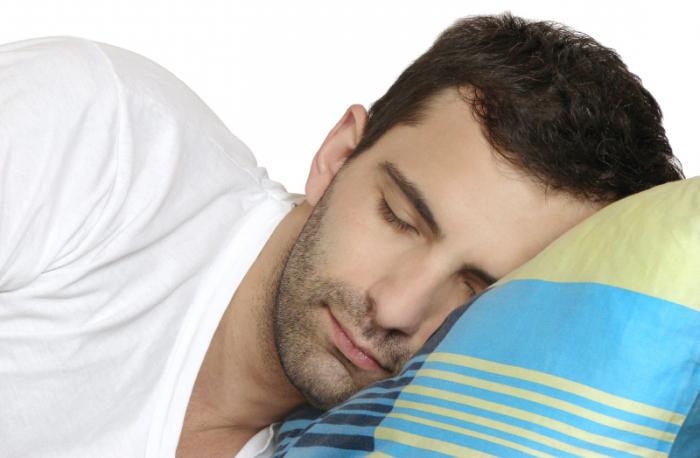
How the sedative works in detail and step by step - this issue has not yet been fully studied by scientists.
Sedatives do not act selectively, that is, all functions of the central nervous system are inhibited to the same extent.
The sedative action takes place in two directions:
- decrease in general excitation processes;
- increased braking.
It is known that the action of a sedative drug reduces the response to external stimuli and reduces the daily activity of a person.
Sedative, not having a sufficiently pronounced hypnotic effect, ease the onset of sleep.
In combination with a sleeping pill and an analgesic, it will enhance their effect. By normalizing the emotional component, the sedative also acts on the vegetative sphere.
For example, herbal sedatives have a beneficial effect on the cardiovascular and digestive systems.
Sedatives are included in the complex therapy of spasms in vascular pathologies of the heart, brain and spinal cord, limbs.

It is important to remember that the competent appointment of a sedative drug, as well as its cancellation, is a task exclusively for a specialist.
The only true condition before treatment with a sedative is that each of the extensive list of substances must be prescribed by a doctor.
Only a specialist can differentiate and determine the cause of the disorder, and his appointment is very important.
The difficulty lies in the fact that a nervous breakdown can indicate the onset of a serious mental pathology, and a hormonal disorder or a serious illness can be behind the usual irritability.
It is acceptable if a person buys and takes sedatives with a mild sedative effect on a plant basis. They do not have a number of side effects that are dangerous to health. They do not act with ricochet or withdrawal syndrome and are therefore available over the counter without a prescription.
Antipsychotics, tranquilizers and antidepressants not only benefit the patient, but can also seriously harm.
Drug dependence, the development of a withdrawal syndrome, mental disorders and imbalances in the work of the autonomic nervous system are not a complete list of side effects that drugs can have after uncontrolled intake.
Contraindications
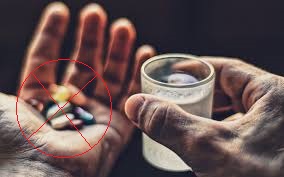
For therapy with sedatives, there are no contraindications, except for the individual tolerance of some components.
Sedation is generally well tolerated. They have a minimum of side effects and contraindications.
If there is no hypersensitivity to certain components and dosages are observed, treatment is successful and efficient.
Overdose of sedatives may cause muscle weakness with drowsiness, persistent drop in blood pressure, and dizziness.
Read about how to relieve and treat dizziness with osteochondrosis of the cervical spine.
With intoxication with large doses of sedatives, the following are possible:
- functional disorders of the nervous system in the form of impaired memory, impaired concentration, disorientation;
- liquor hypertension;
- depression of respiratory function.
Antipsychotics can cause the development of the so-called neuroleptic syndrome.
Its manifestations are a side effect of therapy with this group of drugs. Neuroleptic syndrome is movement disorders in combination with neurological complications.
Scientists have already proven that it can develop after treatment with antipsychotics, not only in various forms of mental pathology and neurological disorders. After therapy with antipsychotics, it can develop in practically healthy people..
List of medicines
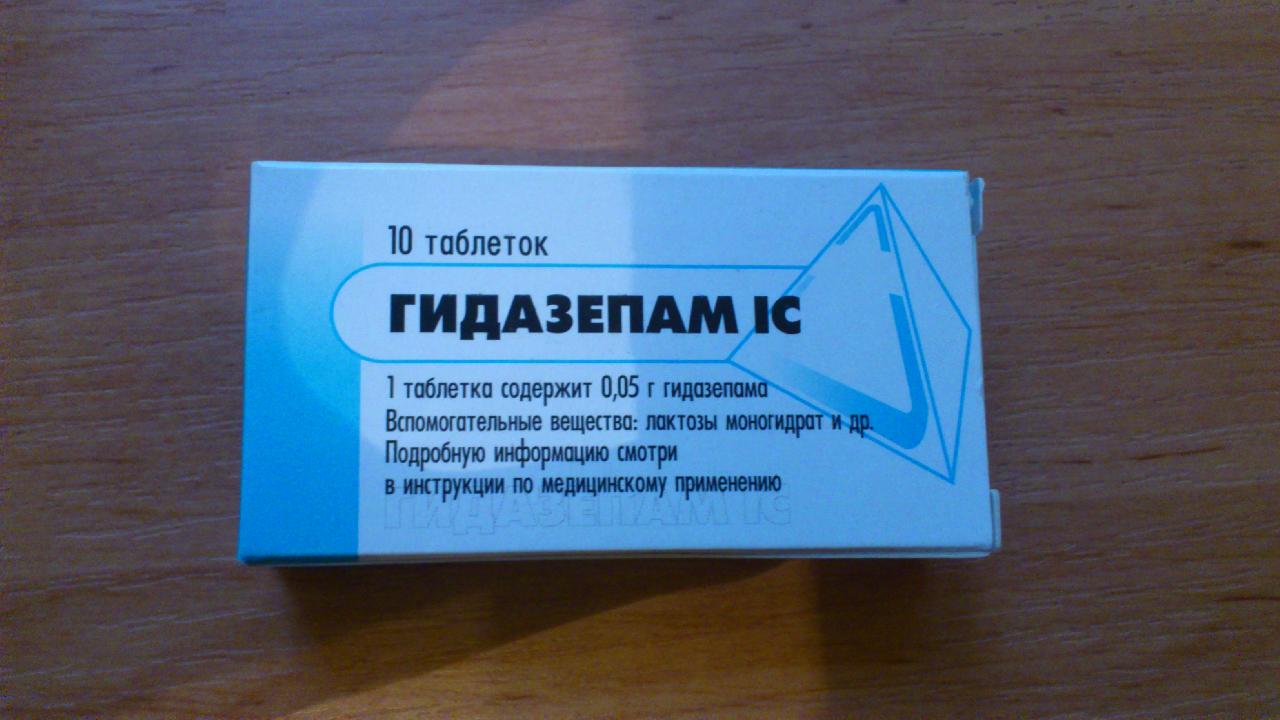
Gidazepam, as one of the types of tranquilizers, has a sedative effect, but at the same time non-drowsy... For this action, the drug is also called a daytime tranquilizer.
With the help of Gidazepam, you can remove anxiety, emotional peaks, fears, phobias... The drug has a beneficial effect on the autonomic function of the nervous system: it normalizes the heart rate, eliminates vascular spasm.
For the treatment of productive symptoms in the form of delusional ideas, emotional states, hallucinations, it is not used, because it does not affect these processes. It has anti-anxiety and anticonvulsant effects.
Indications for the use of the drug:
- anxious and obsessive states, fears, tension, increased excitability;
- migraine;
- asthenia;
- for the complex therapy of withdrawal symptoms;
- in the complex therapy of logoneuroses.
Produced in tablets in dosages of 0.02 and 0.05 g. Belongs to list B, dispensed with a prescription.
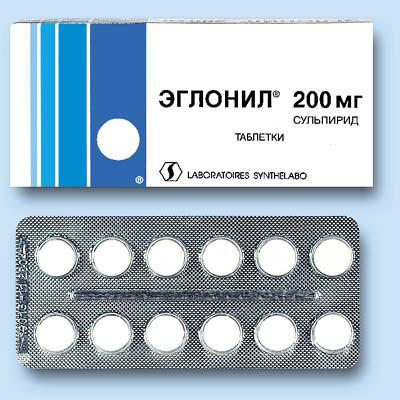
Eglonil (the main active ingredient is sulpiride) is an antipsychotic antipsychotic, antidepressant and antiemetic drug.
It is indicated for acute and chronic psychoses with symptoms of lethargy, delusional states, confusion.
Used in complex treatment schizophrenia, neurotic conditions... It relieves psychosomatic symptoms that accompany gastric ulcer and duodenal ulcer.
Eliminates apathy, depression, but does not work with productive symptoms (delusions, affective states, hallucinations). A slight sedative effect is possible only in case of excessive dosages.
The drug is available in tablets (200 mg), capsules (50 mg each) and injection solution (2 ml 100 mg). Belongs to list B, dispensed by prescription.
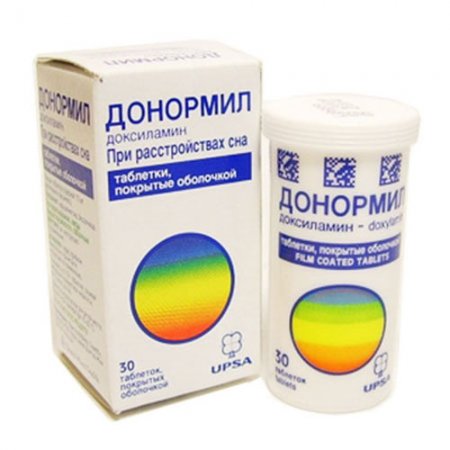
Donormil (with the main active ingredient doklylamine succinate) is a sedative with a pronounced hypnotic effect.
The drug is indicated for patients suffering from sleep disorders with various etiologies and insomnia.
It has a sedative and calming effect. The drug significantly reduces the time it takes for a person to fall asleep. The drug improves the quality and duration of sleep (about 8 hours).
The drug is prescribed for insomnia, allergic manifestations, with general and localized itching of a neurogenic nature.
There is evidence that the drug is effectively used in the complex therapy of colds, has an overwhelming effect on severe coughing attacks.
The drug is available in film-coated and effervescent tablets (15 mg).
Soothing teas
For nervous disorders, there are many safe herbal sedatives available. Sedative tinctures and teas are not addictive, they act mildly.
The most popular ones that can be used as sedative mono-teas and in combinations are:
- chamomile flowers (muscle relaxant, antispasmodic);
- (with a calming effect);
- valerian rhizome (eliminates nervousness and excitement);
- wormwood herb (relieves tantrums and insomnia);
- mint leaf (soothes, relieves spasm of smooth muscles);
- hawthorn fruits (sedative and cardiac effect).
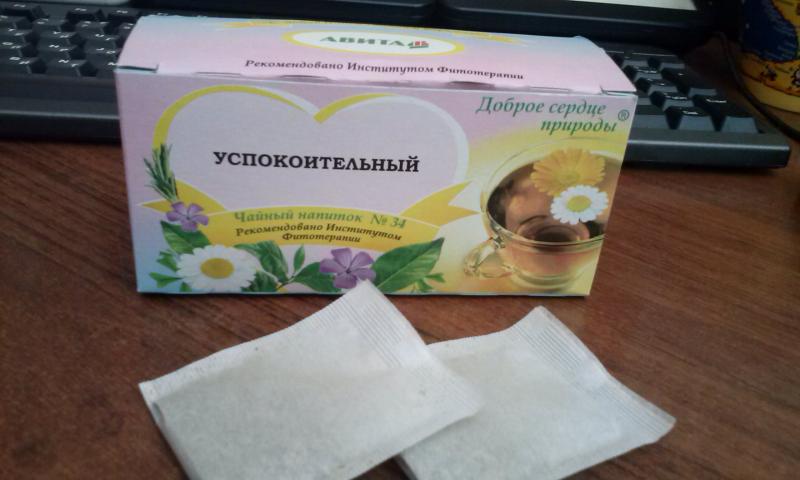
For the preparation of sedative mixtures for herbal drinks are also used thyme, peppermint, motherwort, small-leaved linden, marsh dryweed, blue cyanosis.
Phytotherapists distinguish azure cyanosis from this list, which is 10 times more sedating than valerian root. It is believed that the action of motherwort is also 4 times more effective than valerian. All herbs have a specific, repulsive smell and taste, and this prevents them from being used on a daily basis.
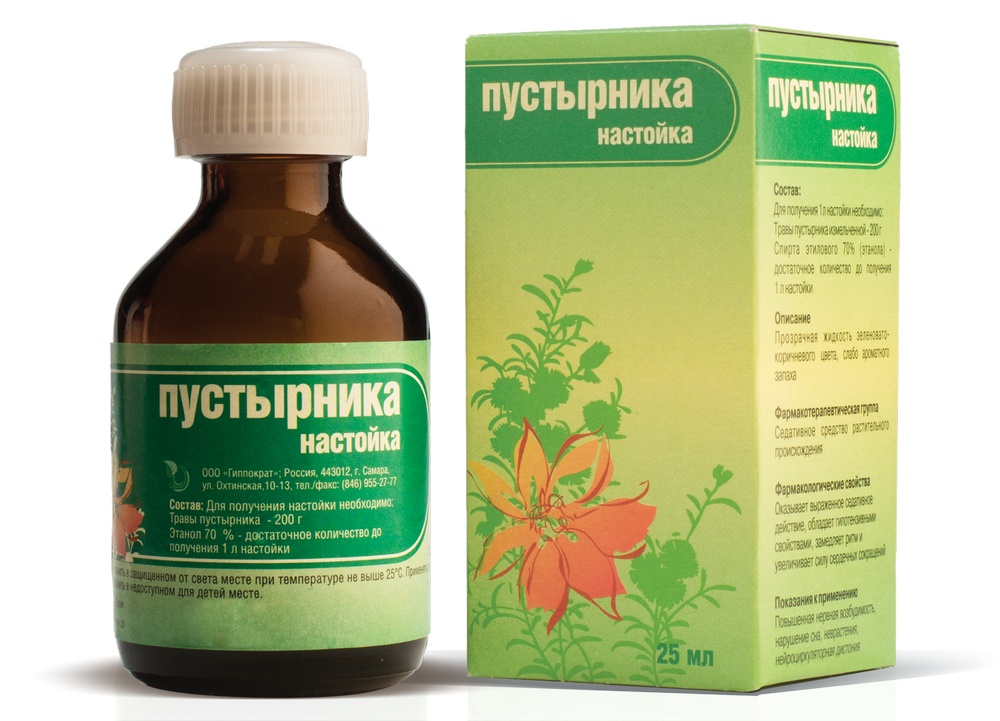
On the basis of motherwort, a sedative and sedative alcoholic tincture is prepared.
The drug is used in complex therapy for myocarditis, cardiosclerosis, with nervous excitability, sleep disorders and insomnia.
It is used as an anticonvulsant, cardiotonic, diuretic drug.
In addition to the sedative effect on the central nervous system, motherwort tincture has a beneficial effect on the work of the gastrointestinal tract and normalizes metabolic processes in the body. Motherwort is effective for headaches of an intoxicating nature.
Motherwort tincture has a minimum of contraindications and side effects. Rarely, but individual intolerance and allergic manifestations are possible.

Valerian tincture is used as a sedative for excessive nervous excitability, inadequate reactions to sources of irritation.
The drug is indicated for the treatment of patients with increased nervous excitability, hysterical tendencies, with psychopathies of obsessive states.
The drug acts as an antispasmodic. With regular use, it normalizes smooth muscle tone and relieves spasms in the gastrointestinal tract.
The sedative effect of valerian alcohol tincture can be considered delayed - it works if a certain dose (almost 100 mg) accumulates in the body. Therefore, treatment should take place in a course, valerian tincture does not give a quick effect.

